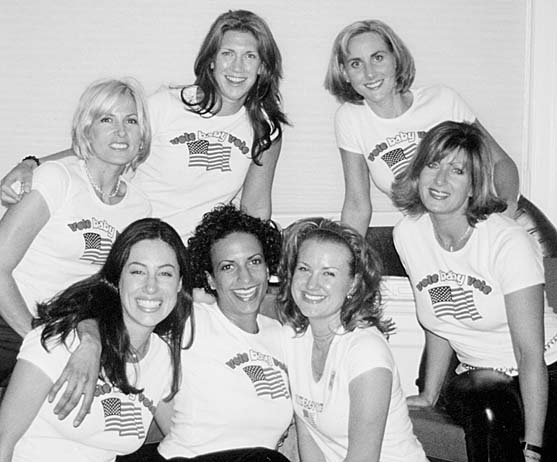|
|
|
As George W Bush emerges from the true political arena of US politics, the courts and attendant legions of lawyers, he will undoubtedly present himself as a winner. I don't agree, a victory yes, but a pyrrhic victory, gained at too high a cost for his supporters the US right wing. Did anybody win in the 2000 US elections? Definately, the Green Party, Ralph Nader in particular and liberal (what in the US is called left) leaning politics was a victor. However, and there is always a however or a but or a nevertheless, the left can be far more divided than the right and there's the rub. Ed Rampell's article below hints, the two party system, called `the evil of two lessers' by long time CPUSA President Gus Hall, is a hugely successful divide and rule mechanism that has been serving conservatism for as long as the contending political system of Democracy has existed. An even bigger divisionary factor is that between men and women. Will Ralph Nader and the politics of inclusion successfully conquer the two-party Everest, maybe, if the climbing team can stick together. Comment by Ed Rampell An American third party that declares feminism as a key tenet and which included a female vice presidential candidate helped throw the presidential race into electoral limbo, and has emerged as the nation's fastest growing political party. But the Green Party campaign of Ralph Nader and his running mate Winona LaDuke was criticized by several prominent feminists, who feared that it would result in the election of Republican candidate George Bush. Some 238 Green Party candidates ran for national, stateand local offices, producing 20 winners - eight of them women. Nader and LaDuke received more than 2,600,000 votes nationwide, approximately three percentof ballots cast. This is about the third largest presidential vote for a left-leaning third party in U.S. history, and the largest tally since Robert La Follette's Progressives scored 4,800,000 votes in 1924. Moreover, if the Green Party had not been on the presidential ticket, Democratic candidate Al Gore would have won the critical state of Florida where 96,000 voted for Nader and LaDuke. Therole this third party played in affecting the presidential race's result, and its long-range impact, could be the most surprising - and historically significant - legacy of Nov. 7's vote. What does the Green Party believe in, and what were the goals of its presidential campaign? Nader said "a shift of power from big business to the people [is] really the theme of the entire campaign." He decried "corporate welfare... a booming economy... and vast poverty, 25 percent poverty for children... and the majority of workers making less today than 25 years ago... while working 163 hours more a year... The top one percent has a net worth equal to the bottom 95 percent.... [Microsoft founder] Bill Gates has more wealth than 120 million other Americans... These... disparities flow from... the disparity in power, between the few over the many. Everywhere... the people fear... they've lost control... over their government, workplace, marketplace, environment, children, schools..." Nader also condemned "Republicrats" for "a bloated military budget [and] foreign policy that supports dictators and oligarchs, instead of workers and peasants," and called for "waging peace." Regarding women's issues, the Green Party plank states as one of its core values that "We have inherited a social system based on male domination of politics and economics. We call for the replacement of the cultural ethics of domination and control with more cooperative ways of interacting that respect differences of opinion and gender. Human values such as equity between the sexes, interpersonal responsibility, and honesty must be developed with moral conscience." Among the party's high profile supporters is rock singer Patti Smith who told WIN, "My basic concern is what the Green Party can offer a human being... It's people-oriented... a viable third party for the future... based on environmental issues... What's more important for a... mother than the future of her children? There's no issue to me that's more globally important than... protecting our environment, to make sure our children aren't eating genetically engineered food, that they're drinking clean water and breathing non-polluted air." Beyond issues, the Green Party rests on the reputation of its candidates. In the mid-'60s, Nader, a lawyer, wrote Unsafe at Any Speed, attacking General Motor's dangerously designed Corvair car. Since then, Nader has been on the frontlines of public interest issues, such as protecting the environment and worker safety and rights, and condemning NAFTA, WTO, and other trade treaties. Vice presidential contender Winona LaDuke, 41, is an American Indian activist and writer. An Anishinabe from the Makwa Dodaem (Bear Clan) of the Mississippi Band of the White Earth reservation in northern Minnesota, LaDuke first spoke out about Indian issues at the United Nations when she was only 18. Since then she fought to recover land once held by the Anishinabes and taken by the federal government. She is also author of Last Standing Woman, a 1997 novel about the history of the Anishinabe community and All Our Relations: Native Struggles for Land and Life. She now works in a national capacity as program director for Honor the Earth and is board co-chair for the Indigenous Women's Network, which she founded. But despite the presence of LaDuke on the ticket and its pro-feminist views, many leading feminist organizations and individuals, including Gloria Steinem and Feminist Majority Foundation board member and United Farm Workers (UFW) co-founder Dolores Huerta, vigorously backed Gore and called upon women not to vote for Nader. They argued that a Bush victory would result in the appointment of anti-abortion Supreme Court justices, and the enactment of legislation curtailing or ending women's reproductive rights. Many female voters apparently agreed since in the majority of states more men than women voted for Nader, according to gender voting results released by the Feminist Majority. The most Green candidates and victors - including several women -- were from California. A quarter million voters cast their ballots for Medea Benjamin in her unsuccessful Senate contest. Benjamin is a founding director of Global Exchange, a human rights organization, and worked as an economist and nutritionist in Latin America and Africa for the U.N.'s Food and Agriculture Organization and the World Health Organization. A spitfire of a speaker, Benjamin helped lead the December 1999 protests against the World Trade Organization in Seattle. Benjamin's Senate campaign included many feminist causes such as "a living wage... paid time off for maternity and paternity leave, and a national system of safe, affordable daycare," as well as "a quality, universal, publicly-funded, single-payer healthcare system." Another female candidate in California, Iranian-born Sara Amir, received a higher percentage of the vote than any other third party candidate in California in a partisan race, although she ultimately lost. She tallied ten percent of the ballots for the State Assembly in the 42nd District of Los Angeles - the U.S. city with the largest overseas Iranian population. Amir is Chief of Cleanup Operations in Southern California for the California Environmental Protection Agency. In 1998, the scientist -- who has a Masters Degree in environmental engineering from the University of Southern California -- polled 250,000 votes as the Green candidate for California Lt. Governor. Amir was born into a middle class family in Tehran, and received her Bachelor's degree there. She told WIN: "I was anti-shah... [but] I first became political because of women's issues... After the 1979 revolution... I was very upset that women who participated in the revolution had their rights taken away from them... I'm very much against compulsory wearing of the veil... By choice is fine... I was one of the women organizers against wearing the hijab [headscarf] covering and for the women's movement from 1979-1981." Upon settling permanently in California, Amir said she was attracted to the Green Party by their strong stand on feminist and women's issues "There is strong support for getting women involved in the political process," she said. "I was very much encouraged to run as a candidate...Women are 50 percent of party membership, and leadership, too. It is a party of women's equality, and has a very strong pro-choice stand. "One of the issues the Green Party platform talks about is the Equal Rights Amendment, which the women's movement has forgotten. I'm talking about its leadership - the National Organization for Women, and Gloria Steinem. They're not pushing for the ERA [Equal Rights Amendment] anymore. That's very sad. We're in the 21thst century and still don't have the ERA... The Greens very strongly favor equal pay... why do we still have [a woman making] 76 cents for the dollar a man makes for equal work? And it's still lower for an African-American woman, and even much lower for a Latina. We need to deal with these discrepancies, and the women's movement is not pushing on these issues." Amir, who ran against a liberal Democratic male, was bitter that that the National Organization of Women (NOW) didn't endorse a candidate in her race. "I asked for the endorsement of NOW, and filled out their application," she said. "It was like writing a thesis. As a feminist, I thought they'd jump up and endorse me. No... they don't consider Greens... as viable candidates." ver the years, some feminists have been perceived as anti-male, but Greens go beyond single-issue identity politics, and integrate feminism with other issues affecting all of humanity, said Amir. "I don't think Green feminism is in any way male bashing. It's very inclusive," Amir said. "It's just trying to give a chance to that 50 percent of the population that never had a chance before to show their ability and have an equal opportunity... It is a human issue..." Creating what Amir calls "the grass roots alternative" is the Green Party's real goal, The strong Green showing - outpolling its rightist rivals in the Reform and Libertarian parties combined and reportedly adding 40,000 new members in California alone -- is full of portent for the U.S. Left. Now that the third party has proven that it's a player in national politics, where does it go from here? After election day, Nader announced, "The Green Party turns itself into a civic force," establishing a national network of storefront community centers and hiring full-time organizers to continue fighting for what Nader calls "the politics of joy and justice." The historic role of third parties in America is to broaden the agenda of and influence the two major parties, just as Democrats ultimately adopted the social security and unemployment insurance advocated by Communist andSocialist candidates during the Depression The Greens' new vote-getting clout can pressure waffling and right-leaning Democrats to move leftward. The pro-feminist Greens gave a one-two punch to the U.S. two party system, and could some day knock it out altogether. But whether that's something feminists want remains to be seen.. |


